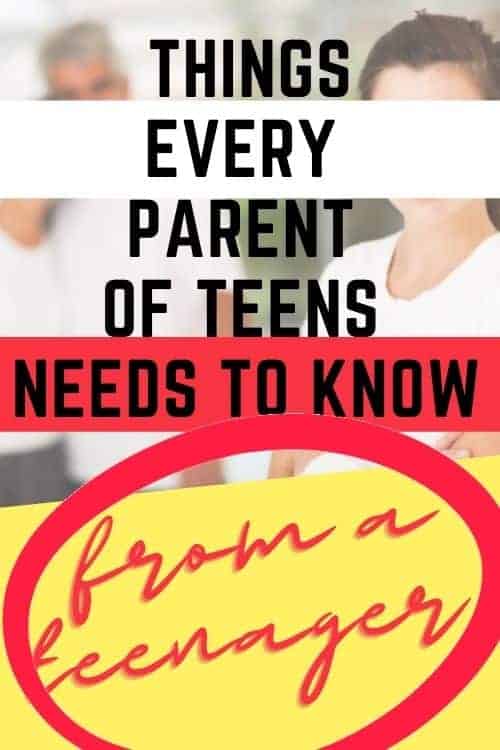
What My Teenagers Want Parents to Know
A few days ago, I was driving with my oldest son when we heard a clip from a Christian speaker on a radio program dedicated to parenting. The clip came at an interesting moment for us in our relationship, as I was following through with consequences and was definitely not my son’s favorite person. But from that clip came a great conversation and my son opened up to me about what teenagers really want their parents to know.
The speaker said something like this, “Often, we think that teenagers don’t want to be with their parents, so we give them their space, but I think teenagers really do want to be with us. We just need to seek them out and keep pursuing them and keep expecting them to spend time with us.”
I will be the first to admit that I thought that way too once. In fact, a friend of mine told me that her daughter spent most of her time in her room because she didn’t want to spend time with her family, and my judgmental heart immediately thought, Take her electronics out of her room and she’ll want to come out.
But in that moment, when I heard that speaker saying that, I bristled. It was probably because my son was listening with me and I knew that even though he was working hard to be respectful and pleasant at the time, I was definitely not someone he wanted to be hanging out with.
So, I addressed the awkward moment by asking, “What do you think about what she is saying? Do you think she’s right? Or not so much?”
He replied, “Do you really want to know or do you want me to say what you want to hear?”
I said, “I’m actually pretty sure I already know so I want you to tell me the truth.”
What he said was actually really wise…and not totally what I expected him to say.
Two Things My Teenager Wants Adults to Know:
- Don’t Speak for Us!–
The first thing my son said was, “I hate when adults think they can decide something about every teenager based on what they know, or even just think about one teenager. Why does this lady think she should tell my parents what I’m thinking when she doesn’t have a clue who I even am?”
So true. And it was humbling because I’m sure I’ve done this…maybe even to you guys!
My son was completely correct. What makes us think we have the right to do that? In this particular instance, he was irritated that a “parenting expert on teens” was saying that he really did secretly want to spend more time with his parents and family.
He actually told me, “Mom, my siblings irritate me so much. Do parents ever stop to think that maybe it’s not that teenagers hate their parents? Maybe I just don’t want to hang out with my siblings!”
And then he said something very sweet: “Mom, the difference between you and this lady telling you how to parent is that you actually ask me how I feel instead of just deciding for me.”
It meant a lot to me, even though I know I have been just where this expert was at! In any case, it was incredibly eye-opening. I learned that one of the things my teenager wanted me to know was that he didn’t always consider me the problem! Instead, sometimes, spending time with parents and siblings was overwhelming for him.
The takeaway? Ask your teenager his thoughts and feelings. Don’t speak for him or her and decide things based on what someone else thinks or says about parenting teenagers!
- Don’t Lump Every Teenager Together!–
After that, I said to him, “Would you agree that it’s unfair to lump all teenagers into one big group?” He almost shouted, “YEESSSSS!”
He said, “Mom, do adults realize that when they talk about “teenagers” they are really including thirteen-year-olds to nineteen-year-olds in that? That’s a big range of people, but apparently, ‘we’re all the same!’”
I have really pondered that. What are we thinking?!
My husband was a teenager when we got married! He was definitely not dealing with the same issues as a thirteen-year-old!
Apart from that, my son pointed out that every teenager is not alike in personality. He pointed out that right now, my younger son enjoys spending time with the entire family, so maybe the speaker has a teenager with that personality, but he said, “People don’t really ever like being lumped together, so why is it okay to do that to teenagers?”
Truth.
I respect what he had to say. I was grateful for that clip on the radio because even if the speaker got it wrong, it got my son and me talking about it, which led to this insight.
So, what do we do with this?
Well, we have to change our mindsets. We need to stop talking about teenagers as though they are all the same. It is imperative that we remember they are individuals with different personalities, different approaches to issues and conflict, and just different struggles, in general. They also have different strengths!
It would be wise of us to stop comparing our children to other teenagers and instead, just set reasonable expectations for our individual children.
What are her strengths? What are her weaknesses? How can those strengths be complimented and the weaknesses be strengthened?
What are your child’s spiritual gifts? What is his love language? How do our expectations speak to those things?
We need to ask ourselves, “In what areas am I overstepping?” “Am I projecting fears about what other teenagers are doing on to my own teenager (who may be very different from the one I’m comparing to?)” “What can I say, ‘yes’ to?”
What does your teenager want you to know?
I have a final challenge for you. If your teenager has a cell phone, or even an email address, send a message with these words:
“Fill in the blank: I wish my parents knew that I ___________ and I wish that all adults knew that I _________________.”
Hopefully, it will give you insight into what your teens are really thinking about and going through. At the worst, you’ll get a snarky response that you can just delete and forget about. And, if it is something hurtful or harsh, really do just delete it and chalk it up to a bad idea from a blog you read!
But at best, you’ll start a conversation with your teen that proves that you really do care about him! And you’ll come away knowing more than what my teenager wants his parents to know. Instead, you’ll know what your teenager wants his or her parents to know!
For more ways to connect with your 16-18 year-old, check out this article from Focus on the Family!
